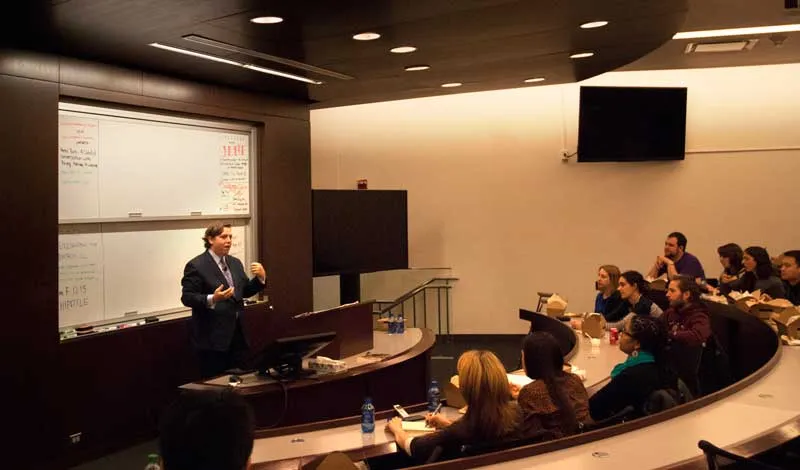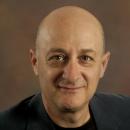Winter CBIs Include Talks on Access Justice, Originalism, and Federalism

Capping off a Winter Quarter lineup that also included discussions on originalism and federalism, Professor Omri Ben-Shahar delivered a Chicago’s Best Ideas talk earlier this month that explored how laws designed to ensure equal access often tilt toward elites and unintentionally hurt weaker groups.
Access justice laws are intended to help weaker consumers through cross-subsidies from stronger consumers, as is the case with Medicaid, said Ben-Shahar, the Leo and Eileen Herzel Professor of Law. But with some programs, an opposite, presumably unintended, effect can emerge — and it is important to recognize when this has happened.
“These programs actually benefit elites — those who are affluent, more sophisticated, overall those who are less in need — and they are the ones who get most of the value from the program,” he said. “That is not what we want.”
One example: Exam accommodations, such as extended time for students who have been diagnosed with an eligible disability. Across Illinois, 1 percent of students are granted accommodations, but in Chicago’s wealthiest suburbs, 5 percent receive the accommodation, Ben-Shahar said. “Districts with the highest rates of exam accommodations are mostly white, and districts with the lowest rates are mostly poor, non-white,” he said. “But I don’t want you to conclude that exam accommodations are bad because, after all, they do try to level the playing field between kids with disabilities and kids without.”
Another example: Mandated mental health insurance benefits. One study showed that whites and affluent people take advantage of mental health benefits four times more than minorities, meaning that the advantage is tilted in their favor, Ben-Shahar said.
He also pointed to government subsidies for coastal property insurance, which are designed to keep premiums affordable in flood-prone areas where rates would otherwise be quite expensive. But, although there are some exceptions, the majority of waterfront property is owned by the wealthy, he said. The coastal rich, in other words, are cross-subsidized by the less affluent inland residents.
These can be difficult issues to identify and solve, though, Ben-Shahar told a student who asked why the public hadn’t “wised up” to the issue.
“Part of my overall agenda as a scholar is to unmask programs that have this characteristic — they are widely used, widely believed to have value, but they really don’t,” he said.
Alison LaCroix: The Shadow Powers of Article I
Earlier in the quarter, Professor Alison LaCroix, the Ludwig and Hilde Wolf Teaching Scholar, discussed how a shift in the Supreme Court’s interpretation of American federalism has led to a steady growth in ambiguous federal powers drawn from the U.S. Constitution’s Necessary and Proper Clause and, to a lesser extent, the General Welfare Clause. In the past decade, the Court has invoked these “shadow powers” as it has shifted away from approaching federalist issues by examining the scope of Congress’s commerce power via the Commerce Clause, a move that she argued has muddied the federalist debate.
“Since 2005, these two types of shadow power — Necessary and Proper and General Welfare —have become doctrinal battlegrounds for the Supreme Court in federalism cases, but in a stealthy way, which makes them shadow,” she said. “It seems like nothing’s really happening, or something’s happening at the periphery of the doctrine, then all of a sudden, these clauses are front and center, and you have to ask, ‘How did this happen?’ I think their return to the center of the debate in the Court is an opportunity to figure something out about our federalist structure, but first we have to clear away this thicket of doctrine and reasoning.”
She argued that this shift is a sign that the Court is taking a harder look at congressional power, although not necessarily in the way scholars might expect. “These clauses, which from the beginning people have seen as unbounded and limitless, are actually operating as limits on congressional power. This is another way that they are shadowy.”
She said her critique, though, wasn’t about the actual boundaries of congressional power, but about the Court’s doctrinal approach. “The rise of this species of analysis is doctrinally unprecedented, and it is functionally uncomfortable,” she said. “It makes it very difficult to know: when do we think Congress will respect its boundaries, and when won’t it?”
William Baude: Is Originalism Our Law?
In his talk, William Baude, a Neubauer Family Assistant Professor of Law, examined the meaning originalism, arguing that it is our law and that judges have a duty to be originalists.
“Judges are not just law professors in black robes,” he said. “Judges have a duty to apply the law … In exchange for that power, they make a promise to stay within the terms of the law as they find it. That’s an important duty. I know a lot of the time, the law is ambiguous or vague, a lot of time the law leaves judges a certain amount of discretion … but whatever the bounds of that law are, judges promise to stay within it and not themselves be the agents of legal change.”
That doesn’t necessarily mean that judges just look for the ambiguity, Baude said in response to a student question.
“I’m a little more optimistic than that — I think often they are trying,” he said. “People who don’t think about the history or the text of the Constitution very much may just find things ambiguous because they haven’t thought about it very much. But that’s not really ambiguity.”
What’s more, there’s a lot less room for that these days, he said. “There’s a lot of scholarship, a lot of briefing, a lot of people have done the work. So that makes it a little bit less likely.”
As he dissected recent scholarly arguments about the true meaning of originalism, Baude argued that one can be an originalist and still allow for some interpretation of the Framers’ expectations because they built some flexibility the Constitution. Baude pointed to a comment U.S. Supreme Court Justice Elena Kagan made at her confirmation hearing: “We are all originalists.”
“What she said right before that was that the Constitution contains a lot of broadly worded principles, and sometimes they contain something really specific, and when they contain something really specific, you do the very specific thing it says,” Baude said. “But sometimes it contains broad principles, and then you apply the broad principles. And sometimes that requires you to look at how facts have changed, how other things have changed.”
Although there are limits, as well as times when moral considerations have led judges to operate outside the boundaries, originalism is our law, Baude said. “It is the starting point.”


